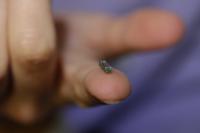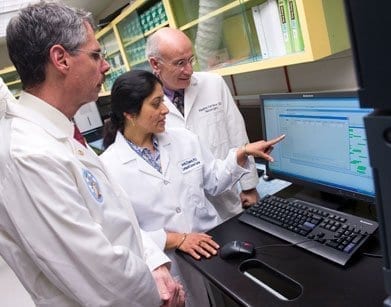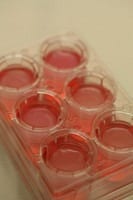
EPFL scientists have developed a tiny, portable personal blood testing laboratory that sends data through mobile phone network
Humans are veritable chemical factories – we manufacture thousands of substances and transport them, via our blood, throughout our bodies. Some of these substances can be used as indicators of our health status. A team of EPFL scientists has developed a tiny device that can analyze the concentration of these substances in the blood. Implanted just beneath the skin, it can detect up to five proteins and organic acids simultaneously, and then transmit the results directly to a doctor’s computer. This method will allow a much more personalized level of care than traditional blood tests can provide. Health care providers will be better able to monitor patients, particularly those with chronic illness or those undergoing chemotherapy. The prototype, still in the experimental stages, has demonstrated that it can reliably detect several commonly traced substances. The research results will be published and presented March 20, 2013 in Europe’s largest electronics conference, DATE 13.
Three cubic millimeters of technology
The device was developed by a team led by EPFL scientists Giovanni de Micheli and Sandro Carrara. The implant, a real gem of concentrated technology, is only a few cubic millimeters in volume but includes five sensors, a radio transmitter and a power delivery system. Outside the body, a battery patch provides 1/10 watt of power, through the patient’s skin – thus there’s no need to operate every time the battery needs changing.
Information is routed through a series of stages, from the patient’s body to the doctor’s computer screen. The implant emits radio waves over a safe frequency. The patch collects the data and transmits them via Bluetooth to a mobile phone, which then sends them to the doctor over the cellular network.
A system that can detect numerous substances
Great care was taken in developing the sensors. To capture the targeted substance in the body – such as lactate, glucose, or ATP – each sensor’s surface is covered with an enzyme. “Potentially, we could detect just about anything,” explains De Micheli. “But the enzymes have a limited lifespan, and we have to design them to last as long as possible.” The enzymes currently being tested are good for about a month and a half; that’s already long enough for many applications. “In addition, it’s very easy to remove and replace the implant, since it’s so small.”
The electronics were a considerable challenge as well. “It was not easy to get a system like this to work on just a tenth of a watt,” de Micheli explains. The researchers also struggled to design the minuscule electrical coil that receives the power from the patch.
Towards personalized chemotherapy
The implant could be particularly useful in chemotherapy applications. Currently, oncologists use occasional blood tests to evaluate their patients’ tolerance to a particular treatment dosage. In these conditions, it is very difficult to administer the optimal dose. De Micheli is convinced his system will be an important step towards better, more personalized medicine. “It will allow direct and continuous monitoring based on a patient’s individual tolerance, and not on age and weight charts or weekly blood tests.”
The Latest Bing News on:
Portable personal blood testing laboratory
- Best Portable Grills of 2024, Tested and Reviewedon May 3, 2024 at 1:00 am
Our expert, award-winning staff selects the products we cover and rigorously researches and tests our top picks ... a quarter century of expertise. Your portable grills need enough cooking ...
- Does Medicare Cover Blood Tests?on May 2, 2024 at 5:00 pm
so check with your plan about specific blood tests. For maximum benefits, consider going to in-network doctors and labs. Costs are based on the particular test, your location, and the lab used.
- FDA brings lab tests under federal oversight in bid to improve accuracy and safetyon April 29, 2024 at 9:09 am
The new regulation was met with pushback from the testing industry, which has long resisted additional government scrutiny.
- Best At-Home Metabolism Tests in 2024on April 28, 2024 at 5:00 pm
But for your personal ... test to check cortisol, free testosterone, and TSH levels. Depending on the kit, you’ll be required to provide blood or saliva samples and ship them to a certified lab ...
- Insulin Resistance – What You Need to Knowon April 21, 2024 at 5:00 pm
As a result, more and more blood ... tolerance test: 140-199 after the second test A1c results of 5.7% to 6.4% If you do have prediabetes, you'll probably need to repeat this lab work at least ...
- Laboratory Freezerson January 12, 2024 at 2:29 am
Portable types ... storing enzymes. Laboratory Freezers are used in pharmaceutical units, research laboratories, hospitals, blood banks, production facilities, material testing, and diagnosing ...
- We Found the Best Exercise Equipment for Seniors After Testing Dozens of Optionson December 20, 2023 at 3:57 pm
It also has a blood oxygen ... also applied her personal and professional experience to determine our top equipment recommendations. Finally, we put some of our top recommendations to the test at home ...
- The 10 Best Massage Guns Of 2023on September 6, 2023 at 1:25 pm
We tested 32 massage guns both in the Verywell Testing Lab under the supervision of physical therapist Dr. Monica Saliu, and at home for several weeks. We also had a board-certified physical therapist ...
- Laboratory proficiency testingon May 19, 2022 at 12:29 pm
Independent proficiency tests are an important tool for laboratories to show evidence of their performance and to ensure that their analytical results can be trusted. The IAEA provides substantial ...
- Blood Bankon October 8, 2020 at 4:11 am
The UAB Hospital’s Transfusion Services (aka “Blood Bank”) is the largest of the clinical laboratories with 40+ employees working ... in cell therapy or Hematopathology. The 60,000+ tests performed in ...
The Latest Google Headlines on:
Portable personal blood testing laboratory
[google_news title=”” keyword=”portable personal blood testing laboratory” num_posts=”10″ blurb_length=”0″ show_thumb=”left”] [/vc_column_text]The Latest Bing News on:
Personalized blood tests
- Developing a Personalized Vaccine Against Cancerous Brain Tumorson May 10, 2024 at 1:05 am
Pairing a personalized dendritic cell vaccine with an immune-boosting compound improves the immune response to malignant gliomas.
- Personalized screening early in pregnancy may improve preeclampsia detectionon May 6, 2024 at 10:02 am
she is much more likely to follow through because it's based on personalized screening test." Among the study's limitations, several women with risk factors for preeclampsia, such as high blood ...
- Personalized screenings could help detect deadly pregnancy conditionson May 6, 2024 at 8:12 am
Personalized screening early in pregnancy may improve detection of a potentially deadly complication, suggests a new study. The more extensive screening method in the first trimester of pregnancy may ...
- Personalized screening approach may better predict preeclampsia in the first trimester of pregnancyon May 6, 2024 at 7:16 am
A new screening algorithm for preeclampsia combining maternal history, ultrasound data and several tests for blood markers may better predict the majority of preeclampsia cases in the first trimester ...
- How AI Revolutionizes Lab Tests: Faster, Smarter, More Personalizedon April 30, 2024 at 12:36 pm
AI revolutionizes lab diagnostics with faster, more precise, and personalized testing, significantly improving patient care and ...
- Blood Tests for Alzheimer’s Could Become Routineon April 29, 2024 at 5:00 pm
This article was produced in partnership with the Davos Alzheimer’s Collaborative by Scientific American Custom Media ... We can now offer blood tests that can enable earlier and more accurate ...
- Blood test detects signs of osteoarthritis 8 years before X-rayon April 29, 2024 at 11:34 am
Researchers have created a new blood test that could lead to earlier intervention for those with osteoarthritis.
- Can Genetic Testing Reveal the Right Antidepressant?on April 27, 2024 at 6:23 am
Pharmacogenetic testing is also insightful about how non-pharmaceutical interventions, such as dietary supplements like l-methylfolate or magnesium, might benefit patients. The test even offers ...
- Proactive health testing is the key to longevity and wellnesson April 22, 2024 at 9:56 am
Living a longer life has always been an aspiration for many, but longevity without health is a hollow victory. As Dr. Nathan Price, co-author of The Age of Scientific Wellness, points out, the focus ...
- Smart nutrition: Benefits of personalized vitamins and supplementson March 15, 2024 at 12:44 pm
Elo is a revolutionary company that makes custom supplements based on your biomarkers from at-home blood testing and data from wearables. Its plan involves biomarker testing every 90 days to assess ...
The Latest Google Headlines on:
Personalized blood tests
[google_news title=”” keyword=”personalized blood tests” num_posts=”10″ blurb_length=”0″ show_thumb=”left”]










